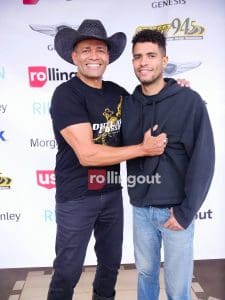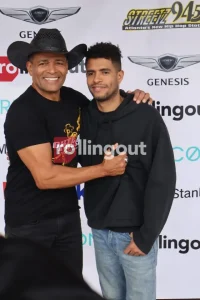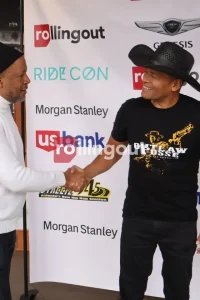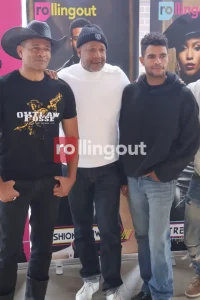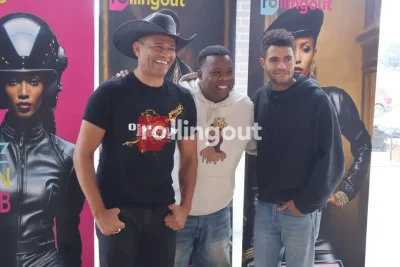When many people ponder life’s meaning, they think beyond themselves, into the future where pehaps something they did right in their life positively impacts the next generation. Mario Van Peebles embodies this mission as a connector between generations in Hollywood.
The film producer, director, writer and actor followed the footsteps of his father, Melvin Van Peebles, who broke down so many doors in the film industry for Black and Brown creatives with the breakout 1971 movie, Sweet Sweetback’s Baadasssss Song. Mario established himself in the business after directing the 1991 film, New Jack City.
In 2024, Mario’s children — Morgana, Maya, Makaylo, Marley and Mandela — who are also actors, continue the family’s lineage in show business. In Mario’s latest release, the independent film Outlaw Posse, he has the pleasure of acting beside his son Mandela in a role where Mario plays the patriarch.
Recently, while relaxing in the green room during the 2024 RIDE Con at Morehouse College in Atlanta, Mario and Mandela spoke to rolling out about the Van Peebles’ legacy and Outlaw Posse.
What was the inspiration for Outlaw Posse?
Mario: A lot of folks don’t know almost 1 out of 4 cowboys were Black.
If Hollywood knows heavyweight champs look like Jack Johnson, [Muhammad] Ali, [Mike] Tyson, they’ll still make the champ look like Rocky in the movies, and Hollywood knows that.
Martial arts was invented by the Asians. Karate, by the Japanese specifically, the Karate Kid doesn’t get to be Asian. Dances with Wolves will not start [with] a Native American. We’ll become the exotic backdrop. The dominant culture will put itself in a dominant way in the movie.
That is traditionally how it’s been. So, if we looked at Westerns from back in the day back in the early Westerns, if you were a White male, you did pretty well. But if you were Black, you were scared and shuffling. If you were a woman, you were pale, frail, and needed rescuing. If you were Latino, you were an oily bandit. All colors were marginalized, including women. But the truth is, the West was wild, and it was diverse.
Out of the first 44 settlers in Los Angeles, 26 were African American. Long before women could vote, there were badass sisters like Stagecoach Mary, who had her own stagecoach that she ran up through Montana. She had a big old shotgun and a cigar, and that role in Outlaw Posse is played by Whoopi Goldberg.
I wanted to show the West more accurately. Edward James Olmos is in it, D.C. Young Fly is in it, Cedric The Entertainer’s in it, Emmett Walsh, Neal McDonough, badass White folks, bad Black folks, all of us.
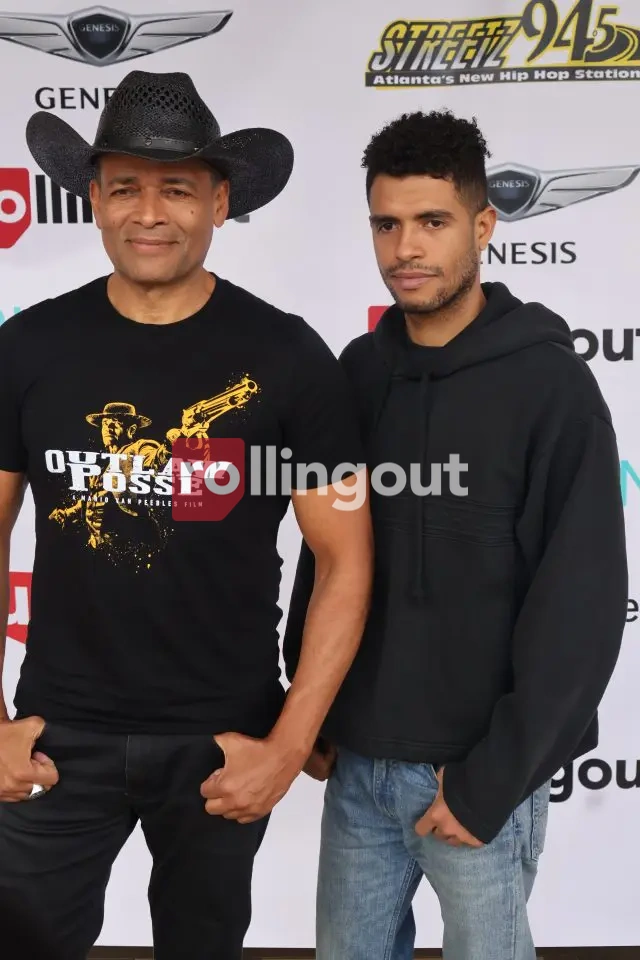
Mandela, what was life like for you growing up as Mario Van Peebles’ son? Was there extra pressure to learn how to audition and act?
Mandela: What’s cool about him is, he’s never, never pushed anything onto me or any of my siblings. I have a big family, so I have sisters that have nothing to do with the industry. And I have a sister who is crushing it. I have my brother, who’s more behind the scenes and is doing what he wants to do.
So we don’t really conflate doing something we love with being good at what we’re doing. If he’s giving me notes, I know he’s not gassing me up. It’s how we actually feel. That’s what makes working with him, I wouldn’t say easier, but more smooth. I know his notes are coming from a place of love. He wants to see me win. So, the direction, whether good or bad, is valid. He’s a good guy. He’s fun. It’s fun.
What have you learned from your father and grandfather about making independent films?
Mandela: Being around [them], you see the whole thing. Even [doing interviews], this realistically still falls under making the movie because you see the ideas, writing process, preproduction, the actual production, and now when it’s in post and we’re promoting it. There’s way more to making a movie than just acting.
Mario, when you see your son pick up that many details about the process, how does that make you feel?
Mario: It’s great to see that evolution with anyone, but especially someone you just go, “Oh, man. I’ve known this guy forever.”
I always joke that we’re like the Jacksons without the talent. Being around my dad, I didn’t always like him as a kid. I called him a paternal fascist. When I got to Hollywood and was trying to act, there weren’t any good roles. There were just really simple, reductive, and stupid roles. Basic roles. I would try to get rolling and do something different with the roles and figure it out. You would see me in all kinds of wacky little movies, five minutes here, two minutes there, and I was like, “D—. These are some wack scripts.”
So I said, “Well, maybe I should start writing.” As I was trying to finish the script, my father came out and helped me. Then I sold it, and I was like, “Wow. I can make money from what’s here. Not having anything to do with how it looks, I can make money from writing something and selling it.”
Then, they couldn’t find a good director, and I figured I’d start directing, and [with] each step I went further into doing it myself. I wound up working with my dad and learning more about it.
It took a lot of energy, and I didn’t know how much it took to get done. So, it’s nice to hear [Mandela] say he sees that because you don’t want to make it so easy your kid doesn’t have an idea of what it takes.
Cover photo by Morgana Van Peebles

